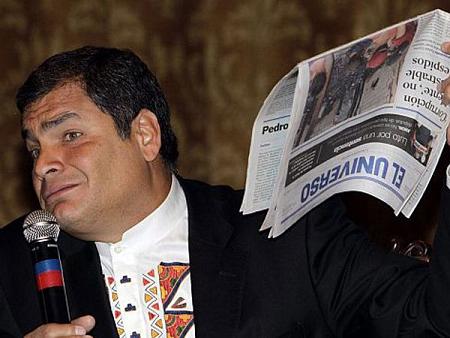Press freedom in South America has been
in flux since the Diario de Pernambuco, the continent’s oldest
newspaper, first put ink to paper in 1825. As long as there have been
authoritarian governments in the region, powerful figures in one
administration after another have struggled to mitigate the effects of
negative media coverage. In many contemporary legal cases, the
resulting litigation has developed into outright censorship. For
example, in 2007, the Argentine media sent President Cristina Kirchner’s
Casa Rosada scuttling for legitimacy through its coverage of the maletinazo
scandal, in which a U.S. assistant attorney alleged that Venezuelan
president Hugo Chavez’s government had attempted to smuggle roughly USD
800,000 in cash to the Kirchner campaign by means of a suitcase
belonging to Venezuelan-American Guido Antonini Wilson. In the same
year, President Chavez abolished Venezuela’s longest-standing private
television channel, RCTV, claiming that its critical coverage was
threatening his government. In 2009, Caracas revoked 34 companies’
radio licenses after Chavez had invoked “tyranny” when referring to
private radio broadcasters. Ironically, Chavez received South America’s
highest accolade for journalism, the Rodolfo Walsh Prize, from
Argentina’s National University de la Plata last year.
These precedents for a free South American press are not encouraging, but recent developments in Ecuador have shed light on a new era for the journalists of the realm. Several days hence, President Rafael Correa suggested that he may waive the USD 42 million in damages awarded by Ecuador’s highest court against domestic newspaper El Universo, as well as the prison terms leveled against some of its journalists, for charges of libel. The newspaper, standing accused of criminal defamation against Correa, has been on the brink of collapse since its director took asylum in Quito’s Panamanian Embassy and three of its top executives fled the country. The financial aspect of the judgment handed down by Ecuador’s Supreme Court would be enough to wipe El Universo off the map, and this perceived stifling of free speech has drawn criticism from countless observers, including the Organization of American States’ Special Rapporteur for Freedom of Expression, the Committee to Protect Journalists, and the Inter-American Commission on Human Rights. The latter has called for an injunction asking Ecuador to suspend the sentence against El Universo until further review by the Commission, which would be initiated in late March.
President Correa’s clout in this battle is clearly superior to that of El Universo’s,
and it is difficult not to see him as the aggressor. Correa’s original
lawsuit requested USD 50 million in damages from four defendants and
another USD 30 million from El Universo itself. The charge was ‘criminal defamation against an authority’ through an editorial titled “No more lies”
in which the author, Emilio Palacio, referred to Correa as a ‘dictator’
and implicated the president in the intent to commit crimes against
humanity during the 2010 Ecuador crisis. In the lawsuit, Correa alleged
that the editorial contained expressions that “offended his honor,
reputation, and dignity” and that Palacio’s article constituted “an
illegitimate and criminal use of free expression.” Although this charge
would not have been sustained in a country like the United States, it
is does derive some credence from the Ecuadorian Constitution’s fuzzy
stance on freedom of speech.
Given that Correa now has the power of
life and death over Ecuador’s largest newspaper, his hinting at a pardon
is both unusual and compelling. It does not necessarily mean that he
has had a change of heart in favor of press freedom, nor does it
guarantee that other South American heads of state will follow his
example. However, Correa pardoning El Universo would signify
to the world that allowing critical press coverage can be politically
viable, and even beneficial. The United States government tolerates
some of the most malignant and defamatory free expression imaginable,
and yet it is difficult to think of a society further from a breakdown
like Ecuador’s failed coup in 2010. Indeed, only tyrants need fear
tyrant-killers (to paraphrase Brutus in HBO’s acclaimed Rome). It would be naïve to think that El Universo
will shrink from political involvement in the future if it survives
this peril; after all, Emilio Palacio faced a similar situation for his
article censuring Camilo Samán, the chairman of Ecuador’s National
Financial Corporation. In that instance, the plaintiff exonerated
Palacio of a three-year prison sentence for defamation, after which
Palacio has continued to write articles criticizing the federal
government. While Palacio and his associates may be a tad more cautious
in the years to come, one can be assured that their journalistic
survival will preserve a modicum of free speech in a free Ecuador.
Update: On February 22nd, President Rafael Correa pardoned El Universo and its staff, who had stood accused of libel against the president.


No comments:
Post a Comment